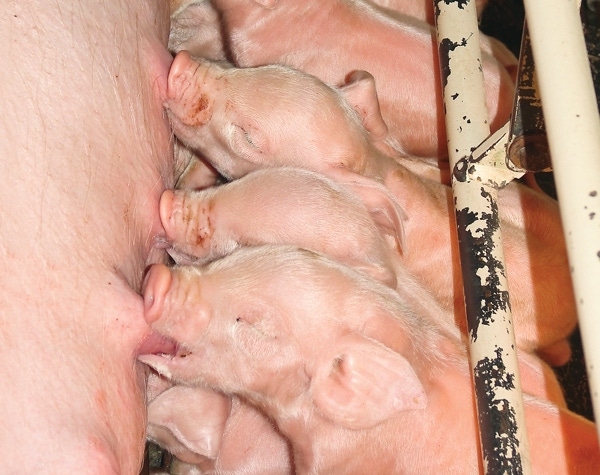Immunoglobulin is Important Benefit of Swine Colostrum in PEDV Battle
April 7, 2014

The recent outbreak of porcine epidemic diarrhea virus (PEDV) reinforces the importance of immunoglobulins in swine colostrum for newborn pigs.
"PEDV is a mucosal or gut surface pathogen, and the way to provide immunity, thereby saving piglets, starts at the level of the gut," said Bob Thaler, South Dakota State University Extension Swine Specialist.
Thaler explained that neonatal piglets have the greatest incidence of death as a result of PEDV because of the long villi (finger-like projections) that line their gut. These long villi house enterocytes, which are absorptive cells, and are the ideal location for PEDV replication. Adult pigs and those pigs that have been weaned have far fewer enterocytes, meaning replication of the PEDV virus is at a much lower level when compared to neonatal piglets.
Protection from PEDV occurs through colostrum consumption. Colostrum is the sow's first milk and it is high in antibodies, which are large proteins also known as immunoglobulins. Lactogenic immunity is provided by immunoglobulin A (IgA), which is found in milk/colostrum from the sow.
"Piglets do not obtain antibodies from their mothers before birth, so colostrum is the first line of defense in building immunity in the piglet," he said. "Immunoglobulin A is important in protecting the intestinal mucosal surface against infections because of its ability to provide a protective barrier. Immunoglobulin A acts as a shield in the gut by not allowing potentially harmful virus particles to penetrate the lining and be absorbed by the body."
For piglets to survive on a PEDV-positive farm, Thaler said they need to ingest colostrum that is high in IgA.
Producers needing to increase the immunity in sows and gilts can help achieve this by administering strong oral doses of feedback containing virus to efficiently boost and stimulate a natural mucosal immune response.
"The administration of the virus to the sow will create an immune response therefore stimulating lymphocyte production in the mammary gland. The increase in lymphocyte production will help increase the number of IgA antibodies in the milk, which will increase piglet survivability after being ingested," he said. "The feedback process has proven an important component in increasing pig immunity in herds already infected with PEDV, and should be administered with guidance by the herd veterinarian."
Producers need to be certain that all newborn piglets have suckled to ensure they have received the immunoglobulin-rich colostrum.
"If piglets are to be cross-fostered, this process should be done when the piglet is older than 24 hours as gut-closure has taken place," he said.
Gut-closure refers to the inability of piglets to absorb immunoglobulins leading to a greater incidence of a suppressed immune system that does not have the ability to protect against disease.
If a producer suspects they have PEDV they should contact their veterinarian immediately.Clinical signs of PEDV range from watery diarrhea and vomiting in the farrowing phase to transient diarrhea in the finishing phase. Adherence to strict biosecurity is the best measure in protecting your farm from being infected with PEDV.
Producers and employees looking for more information may contact Thaler at 605-688-5435 or [email protected].
You May Also Like



